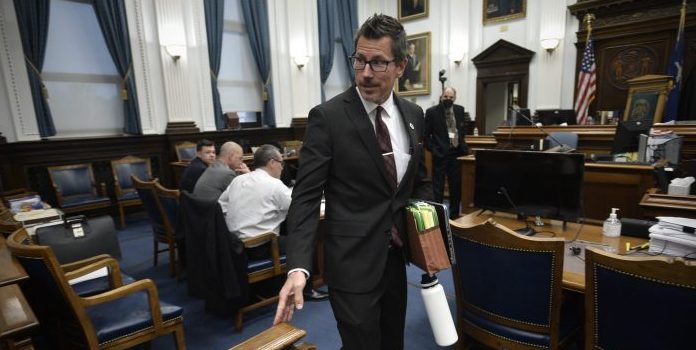(Headline USA) The defense rested its case Thursday at the murder trial of Kyle Rittenhouse, setting the stage for closing arguments Monday.
Rittenhouse’s lawyers put on about 2 1/2 days of testimony to the prosecution’s five, with the most riveting moment coming when the 18-year-old told the jury that he was defending himself from attack when he used his rifle to kill two men and wound a third on the streets of Kenosha in the summer of 2020.
After closing arguments, names will be drawn from an old, brown lottery tumbler to decide which 12 jurors will deliberate and which ones will be dismissed as alternates. Eighteen people have been hearing the case.
Prosecutors and defense attorneys for Kyle Rittenhouse will return to the courthouse without the jury present on Friday to finalize how jurors will be instructed when they get the case next week.
Kenosha County Assistant District Attorney Thomas Binger has struggled to counter Rittenhouse’s self-defense arguments during the Illinois man’s trial, raising questions about whether his office overcharged Rittenhouse.
Daniel Adams, a former Milwaukee County assistant district attorney who isn’t involved in the trial, described Binger’s case as “incredibly underwhelming.”
“He’s got nothing,” Adams said. “I just don’t understand it. What are we doing here? We’re all kind of scratching our heads.”
Jury instructions will be worked out on Friday, and closing arguments are expected on Monday. After closing arguments, names will be drawn to decide which 12 jurors will deliberate and which ones will be dismissed as alternates. Eighteen people have been hearing the case.
Rittenhouse fatally shot Joseph Rosenbaum, 36, in an initial confrontation and just moments later fatally shot Anthony Huber, 26, and wounded Gaige Grosskreutz, 27.
He is charged with first-degree intentional homicide, which is Wisconsin’s murder count; attempted first-degree intentional homicide; first-degree reckless homicide; reckless endangering; and illegal possession of a weapon by a person under 18.
He faces a mandatory sentence of life in prison if convicted of the most serious charge against him.
Prosecutors said they will ask Circuit Judge Bruce Schroeder to allow the jury to consider possible lesser charges on some of the counts—potentially the intentional homicide and attempted intentional homicide charges.
One of the final witnesses for the defense was a use-of-force expert, John Black, who testified that less than three seconds passed between the time somebody fired a bullet in the air and Rittenhouse opened fire on the first man he shot, Rosenbaum.
Black took the stand as part of an effort by Rittenhouse’s lawyers to show that he had reason to fear for his life and acted in self-defense.
Rittenhouse, in his own turn on the stand Wednesday, testified that he heard a gunshot directly behind him as he was being chased by Rosenbaum.
Authorities said the shot was fired by someone else in the crowd.
The account Rittenhouse gave has largely been corroborated by a wealth of video and the prosecution’s own witnesses: Rittenhouse said that Rosenbaum cornered him and put his hand on the barrel of his rifle, the second man hit him with a skateboard and the third man came at him with a gun of his own.
At one point Wednesday, his lawyers angrily demanded the judge declare a mistrial and bar Rittenhouse from being retried — essentially asking that the whole case be thrown out. They accused the chief prosecutor of asking Rittenhouse out-of-bounds questions.
The judge lambasted the prosecutor but pressed on with the case.
Adapted from reporting by the Associated Press

